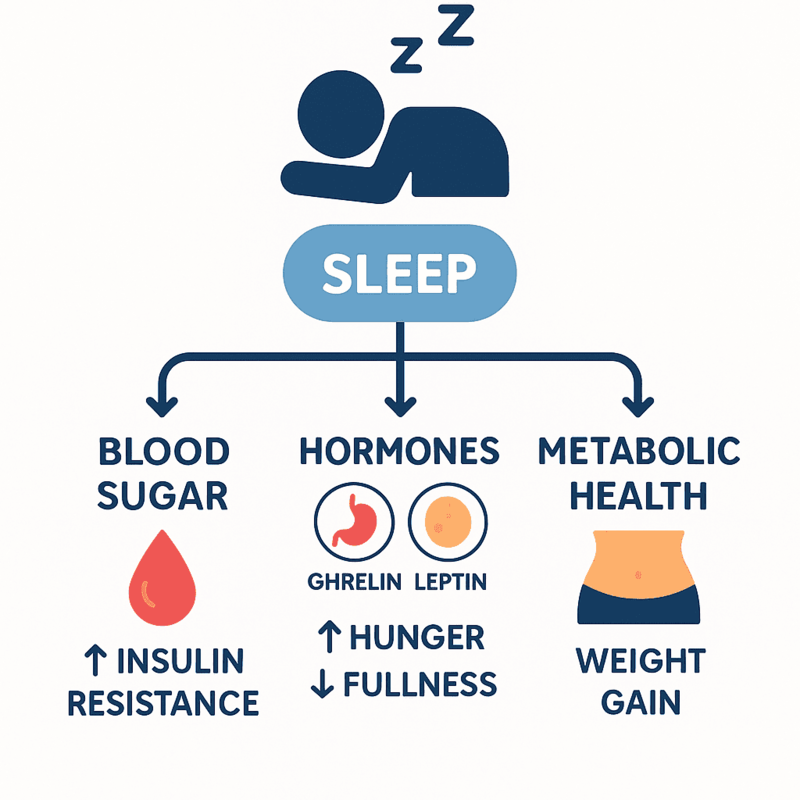Is Sleep Secretly Messing With Your Metabolism?
By: Dr. Gil Barzilay
We all know sleep is important, but how often do we make it a true priority? Especially for those in midlife and beyond, sleep is far more than just a way to rest. It plays a critical role in how your body manages metabolism, regulates blood sugar, maintains healthy cholesterol levels, and even controls weight.
In fact, both too little and too much sleep have been linked to serious metabolic disorders, including obesity, type 2 diabetes, high blood pressure, and heart disease. Here’s what you need to know about the surprising connection between sleep and metabolism.
How Sleep Affects Blood Sugar and Insulin Sensitivity
One groundbreaking study found that healthy young men who slept only 4 hours a night for six nights experienced a 40% reduction in their ability to clear glucose from the blood. Their insulin response dropped by 30%, similar to levels seen in prediabetic individuals.
Even more alarming, research shows that people who regularly get less than 6.5 hours of sleep may need to produce up to 50% more insulin just to maintain normal glucose levels. Over time, this can stress the pancreas, contributing to insulin resistance and increasing the risk of developing type 2 diabetes.
Sleep, Hunger, and Weight Gain
Lack of sleep disrupts the hormones responsible for regulating hunger. Just one night of total sleep deprivation can spike ghrelin (the hormone that triggers hunger) by 22%. Meanwhile, leptin, the hormone that signals satiety, drops significantly.

This imbalance often leads to intense late-night cravings for high-calorie and high-carb foods, which can contribute to weight gain and metabolic dysfunction. Over time, poor sleep can make it increasingly difficult to maintain a healthy weight.
Studies show that people who sleep less than 6 hours per night consume more total calories, fat, and sugar while burning fewer calories throughout the day, further promoting weight gain and a sluggish metabolism.
The Impact of Sleep on Cholesterol and Blood Pressure
Sleep doesn’t just affect your blood sugar and appetite; it also influences heart health. A large national survey of nearly 4,000 adults in Japan revealed that women who slept under 5 hours or over 8 hours had significantly higher triglyceride levels and were up to 5.8 times more likely to have low HDL (“good”) cholesterol.
Poor sleep has also been linked to elevated cortisol levels (the body’s main stress hormone), which can increase blood pressure and contribute to chronic inflammation. Over time, this can have a severe impact on your cardiovascular health.
Finding the Sleep Sweet Spot for a Healthy Metabolism
For most adults, including those over 55, the healthiest sleep duration is between 7 to 8 hours per night. This sleep range is consistently associated with:
- Better blood sugar control and improved insulin sensitivity
- Healthier cholesterol levels and improved heart health
- Better appetite regulation and easier weight management
Getting too little or even too much sleep disrupts your body’s natural hormonal rhythms, throwing your metabolism off balance and increasing the risk of chronic conditions.
About the Author

Dr. Gil Barzilay, PhD, Dipl CM (IATCM, ETCMA), is an expert in integrative medicine, specializing in sleep, metabolism, and aging. He combines Chinese medicine with evidence-based science to help people thrive in midlife and beyond.
- Website: www.drgiltcm.com
- Facebook: facebook.com/drgiltcm
Sources:
- Schmid SM, Hallschmid M et al. (2008), Journal of Sleep Research
- Kaneita Y et al., Sleep, 2008
- Ding C et al., JOMES, 2018
Gottlieb DJ et al., Archives of Internal Medicine, 2005




